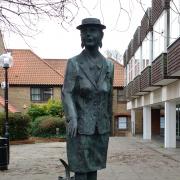Think of prisoners of war during the two World Wars and it is easy to visualise large blocks of stalags crammed with bored servicemen. An image that is less likely to come to mind is the picture of a German soldier, freshly escaped from a country-house prison before negotiating his way to freedom via Tilbury Docks. Though, though,t is exactly what German Gunther Pluschow achieved one week in the summer of 1915.
Although the old black-and-white war films tell many tales of gallant escapes from British servicemen, the German side of the story does not boast many valiant accounts, largely owing to the fact that across both the World Wars, only one individual is known to have escaped Prisoner of War captivity from the island of Great Britain. That individual was, of course, Gunther Pluschow, the illegitimate great-grandson of the Grand Duke of Mecklenburg-Schwerin. An adventurous individual who was credited as an explorer, aviator and author, natural ability seemed to exude from Gunther.
Originally stationed with the German navy at the beginning of the war in China, where he likely acquired his tell-tale dragon tattoo, it did not take long for his prowess as a pilot to be recognised and he was soon an established aviator, a national treasure.
It was in Gibraltar that Gunther was captured by the British and promptly sent to Leicestershire’s Donington Hall. Gunther recalled his first moments after arriving via train, later writing, ‘We were greeted by a howling mob, composed of women and undersized lads and children, but few men. The women and the girls behaved like savages. Yelling and whistling, they ran alongside and behind us, and occasionally a stone or a lump of dirt hurtled through the air.’
To sit by quietly was not in Gunther’s nature - as he wrote, ‘In time captivity became unbearable.....When an English airman soared quietly and securely in the blue firmament, my heart contracted with pain, and a wild, desperate longing set me shivering. I became irritable and nervous, behaved brusquely towards my comrades and deteriorated visibly, both mentally and physically.’
He decided to try to escape. ‘Day and night I planned, brooded, and deliberated how I could escape from this miserable imprisonment. I had to act with the greatest calm and caution if I hoped to succeed.’
The result was his escape, thus triggering a UK-wide manhunt that saw Gunther’s description plastered across the front pages of the newpapers of the day. Bus and train timetables were omitted from newspapers so that there could be little chance that the escaped prisoner could use these to his advantage.
Gunther overheard a conversation whilst he was travelling to London that a Dutch ship was leaving soon from Tilbury docks. Thinking on his feet, his plan was now cemented - this might be his only chance of returning to the Fatherland. And return he did.
The lush Essex countryside soon greeted Gunther as, rather miraculously, he travelled via train to Tilbury Docks, no doubt a welcome sight after the dangers of London. Of course, boarding the Dutch steamer was no easy feat. He later wrote about his midnight exploits, ‘Unnoticed, I reached the buoy. The black hull of my steamer towered high above me. A string pull, and I was atop the buoy. Then I climbed with iron composure - and this time like a cat - the mighty steel cable. Cautiously I leaned over the rail and spied about. The forecastle was empty. I jerked myself forward and stood on the deck.’
On the July 15 1915, Gunther Pluschow successfully returned to Germany, whereupon he was immediately captured as a spy - none of the Germans could believe that it was truly possible for a serviceman genuinely to have escaped from Britain. It did not take long for Gunther to convince them that his story was true and soon he came to be hailed, with special attention from Kaiser Wilhelm II, who gave him the Iron Cross, First Class.
Throughout the rest of the First World War and later the Second World War, no other prisoner of war was known to have successfully escaped from Britain, making Gunther’s story and prowess even more astonishing, as of course was Essex’s part in the Great German Escape.



























